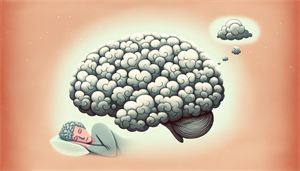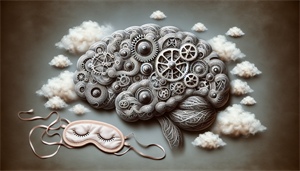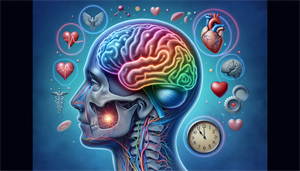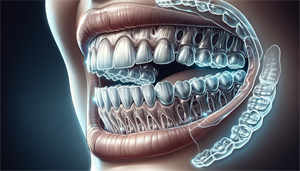Struggling with brain fog due to sleep apnea? Learn how sleep apnea can disrupt your cognitive function and discover effective strategies to combat this issue related to sleep apnea brain fog.
Key Takeaways
-
Brain fog, characterized by confusion and memory issues, is often linked to obstructive sleep apnea (OSA), which disrupts sleep and prevents cognitive restoration.
-
Sleep apnea causes cognitive impairments through repeated oxygen deprivation and interrupts the sleep cycle, leading to potential long-term brain damage and cognitive decline.
-
Effective treatments for sleep apnea, such as CPAP therapy and lifestyle changes, are essential for improving sleep quality and alleviating brain fog, emphasizing the need for diagnosis and management.
What Is Brain Fog and How Does It Relate to Sleep Apnea?

Brain fog is a real, often debilitating condition that affects cognitive function. Imagine trying to think through a dense fog—your thoughts are slow, your memory is patchy, and concentration takes an extraordinary effort. Typically, it manifests as confusion, forgetfulness, and a lack of focus and mental clarity. These symptoms can make daily tasks challenging, impact job performance, and strain personal relationships.
Obstructive sleep apnea (OSA) is a major culprit behind brain fog. OSA occurs when the throat muscles relax excessively during sleep, blocking the airway and causing repeated interruptions in breathing. These apnea events can happen multiple times an hour, severely disrupting the sleep cycle. Consequently, individuals with OSA often wake up feeling unrefreshed, no matter how long they’ve slept. This chronic sleep deprivation directly causes brain fog by preventing the brain from undergoing necessary restorative processes.
Restful sleep is crucial for brain health. During deep sleep, the brain undergoes critical processes such as memory consolidation and waste clearance via the glymphatic system. Disrupted sleep from OSA impairs these processes, leading to cognitive decline and brain fog. Recognizing this connection highlights the need for diagnosing and treating sleep apnea to maintain cognitive function and overall mental health.
The Science Behind Sleep Apnea and Cognitive Function

The impact of sleep apnea on cognitive function is both fascinating and alarming. Obstructive sleep apnea (OSA) leads to intermittent hypoxia, meaning the brain periodically experiences a lack of oxygen due to interrupted breathing. These episodes of oxygen deprivation can disrupt the brain’s normal operations, affecting everything from memory to critical thinking.
Research indicates that OSA-related hypoxia can damage the brain’s gray matter, crucial for information processing. Additionally, the repeated awakenings caused by sleep apnea disrupts the brain from reaching deeper stages of sleep, including REM sleep, essential for cognitive restoration. This sleep cycle disruption impairs the brain’s ability to consolidate memories and perform other vital functions.
Moreover, the brain’s response to chronic intermittent hypoxia includes inflammation and abnormal blood circulation, contributing to cognitive impairments. Sleep apnea doesn’t just cause daytime sleepiness and fatigue; it can lead to long-term cognitive decline and significantly impact brain function.
Recognizing these mechanisms underscores the urgency of addressing sleep apnea as a serious health issue affecting overall brain health.
Symptoms of Brain Fog in Sleep Apnea Patients
Symptoms of brain fog in sleep apnea patients often include excessive daytime drowsiness, memory issues, and difficulty concentrating. If you’ve ever struggled to find the right words, frequently misplaced items, or forgotten appointments, brain fog might be the culprit. These cognitive lapses can make everyday tasks feel like Herculean efforts, impacting both professional and personal life.
Chronic sleep interruptions from obstructive sleep apnea primarily cause these symptoms. Repeated sleep disturbances make it nearly impossible to reach the deeper stages of sleep necessary for cognitive restoration. This leads to a persistent state of mental sluggishness and fatigue, which compounds over time and worsens brain fog.
Mood swings and irritability are also common in individuals with untreated sleep apnea. The frustration of constant fatigue and cognitive impairment can take a toll on emotional well-being. Recognizing these symptoms is the first step toward seeking help and improving both sleep quality and cognitive function.
Diagnosing Sleep Apnea and Brain Fog
Diagnosing sleep apnea and its associated brain fog involves a multi-faceted approach. The first step is recognizing the symptoms and consulting a healthcare provider, preferably a sleep specialist. These specialists can perform comprehensive assessments, including sleep studies, to determine the presence and severity of sleep apnea.
Home sleep tests are an effective and convenient alternative to full sleep lab studies. These tests provide valuable data on sleep patterns, oxygen levels, and apnea events, helping to diagnose sleep apnea. Additionally, video and audio recordings of sleep can offer crucial evidence for healthcare providers, making diagnosing sleep apnea more efficient.
The Apnea-Hypopnea Index (AHI) is a key measure used to categorize the severity of obstructive sleep apnea. This index helps tailor treatment plans to the patient’s specific needs, ensuring effective management of both sleep apnea and brain fog. An accurate diagnosis is crucial for developing a treatment plan that can alleviate cognitive impairments and improve overall quality of life.
Treatment Options for Alleviating Brain Fog from Sleep Apnea

Several treatment options are available for alleviating brain fog caused by sleep apnea. Continuous Positive Airway Pressure (CPAP) therapy is the most well-known and effective option. CPAP therapy involves wearing a mask connected to a machine that delivers a continuous stream of air, keeping the airway open during sleep. This treatment has significantly improved cognitive function in sleep apnea patients.
Lifestyle changes can also play a crucial role in managing sleep apnea alongside CPAP therapy to treat sleep apnea. Weight loss, quitting smoking, and reducing alcohol intake are recommended strategies that enhance both sleep quality and cognitive function.
For those who may not respond well to CPAP therapy, alternative treatments such as oral devices and certain medications can be explored.
Continuous Positive Airway Pressure (CPAP) Therapy
CPAP therapy is the gold standard for treating obstructive sleep apnea. By delivering a continuous stream of air through a mask, it prevents the airway from collapsing during sleep, ensuring a steady flow of oxygen to the brain. This helps maintain restful sleep and plays a significant role in alleviating brain fog.
The effectiveness of CPAP therapy in improving cognitive function is well-documented. Patients using CPAP devices for an extended period often report marked improvements in memory, concentration, and overall mental clarity. The therapy’s ability to prevent apnea events and maintain stable blood oxygen levels is key to its success.
However, CPAP therapy requires consistent use and adjustment. Working closely with a healthcare provider to address any discomfort or side effects can maximize the benefits and ensure long-term cognitive health.
Lifestyle Changes to Improve Sleep Quality
Lifestyle changes are a powerful adjunct to CPAP therapy in managing sleep apnea. Regular physical activity enhances sleep quality and reduces the severity of sleep apnea symptoms. Exercise helps in weight management, crucial since excess weight can exacerbate sleep apnea.
Dietary adjustments also play a significant role. Reducing alcohol and caffeine intake, especially before bedtime, improves sleep quality and prevents sleep disturbances. Managing stress through relaxation techniques like yoga or meditation further enhances sleep quality and reduces the frequency of apnea events.
Creating a sleep-friendly environment is equally important. This means keeping the bedroom cool, dark, and quiet, and establishing a consistent sleep schedule. These changes can significantly benefit individuals with mild sleep apnea and improve overall cognitive function.
Alternative Treatments and Medications
For those who may not find relief with CPAP therapy, alternative treatments and medications are available. Oral devices or mouthpieces designed to keep the airway open can be effective for some patients. These devices are often created in collaboration between dentists and sleep specialists to ensure a proper fit and maximum efficacy.
While medications specifically for central sleep apnea are not yet formally approved, some drugs may help manage associated symptoms. Exploring various treatment options is essential to find the most effective solution for each individual.
Alternative treatments can also include positional therapy, which involves sleeping in a position that reduces apnea events, and surgical options for more severe cases. Consulting with a healthcare provider can help determine the best course of action.
Long-Term Effects of Untreated Sleep Apnea on the Brain

The long-term effects of untreated sleep apnea on the brain can be severe and far-reaching. Studies indicate that individuals with untreated sleep apnea face a significantly higher risk of developing memory and cognitive processing issues. Chronic sleep disruptions can lead to neurodegenerative changes in the brain, increasing the likelihood of conditions like Alzheimer’s disease.
Untreated sleep apnea is also associated with a higher risk of stroke and other cardiovascular diseases. The combination of poor sleep quality, oxygen deprivation, and increased inflammation can accelerate cognitive decline and negatively impact overall brain function, making sleep apnea worse.
Additionally, untreated sleep apnea can lead to mood swings, irritability, and chronic fatigue, further affecting quality of life. Understanding these risks underscores the importance of early diagnosis and treatment to prevent long-term cognitive impairments and maintain mental health.
How to Maintain Healthy Sleep Habits

Maintaining healthy sleep habits is crucial for managing sleep apnea and preventing brain fog. Establishing a consistent sleep schedule helps regulate the body’s internal clock, making it easier to fall asleep and wake up feeling refreshed. This consistency can reduce the frequency of apnea events and improve overall sleep quality.
Creating a comfortable sleep environment is just as important. This includes keeping the bedroom dark, quiet, and cool, and investing in a good-quality mattress and pillows. Avoiding heavy meals, alcohol, and caffeine before bedtime can also improve sleep quality and reduce the risk of sleep disturbances.
Incorporating relaxation techniques such as meditation, deep breathing exercises, or a warm bath before bed can help reduce stress and promote restful sleep. These habits can significantly improve sleep quality, reduce the symptoms of sleep apnea, and enhance cognitive function.
Summary
In summary, sleep apnea and brain fog are closely linked, with the former often leading to cognitive impairments that can severely impact daily life. Understanding the symptoms, science, and treatment options for sleep apnea is crucial for maintaining cognitive health and overall well-being.
By diagnosing sleep apnea early and adopting effective treatment strategies such as CPAP therapy, lifestyle changes, and alternative treatments, individuals can significantly improve their sleep quality and mental clarity. Taking proactive steps to manage sleep apnea can lead to a healthier, more vibrant life.
Frequently Asked Questions
What is brain fog, and how does it relate to sleep apnea?
Brain fog is a condition marked by mental confusion and lack of focus, often resulting from sleep apnea, which prevents restorative sleep and affects cognitive abilities. Addressing sleep apnea can significantly improve clarity and mental acuity.
How is sleep apnea diagnosed?
Sleep apnea is diagnosed by a sleep specialist through comprehensive assessments, including sleep studies and home sleep tests that monitor sleep patterns and apnea events. These evaluations are crucial for accurate diagnosis and effective treatment.
What are the treatment options for sleep apnea?
Effective treatment options for sleep apnea include CPAP therapy, lifestyle modifications like weight loss and reduced alcohol consumption, as well as alternatives such as oral devices and medications. It's important to consult a healthcare professional to determine the best approach for your specific situation.
What are the long-term effects of untreated sleep apnea on the brain?
Untreated sleep apnea can significantly impact brain health, leading to cognitive decline, memory problems, and an increased risk of neurodegenerative diseases and strokes. Addressing sleep apnea is crucial to preserving cognitive function and overall well-being.
How can I maintain healthy sleep habits to manage sleep apnea?
To manage sleep apnea effectively, establish a consistent sleep schedule and create a comfortable sleep environment while avoiding heavy meals, alcohol, and caffeine before bedtime. These practices will significantly enhance your sleep quality.


